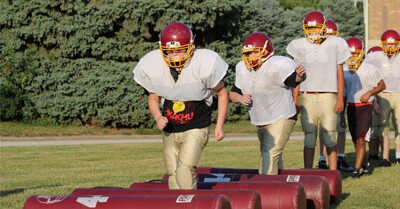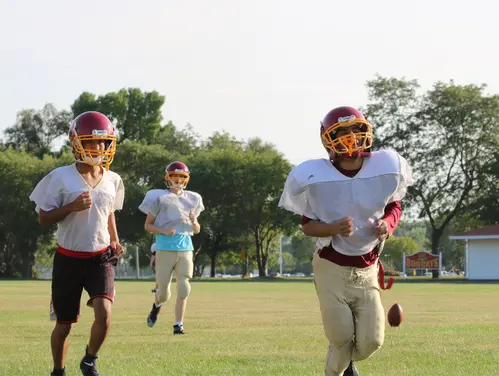It’s not whether you win or lose but if you get to play the game.
No one understands this modified adage more than the 2023 Iowa School for the Deaf (ISD) football team. The last time the Bobcats were on the field was 2019. The pandemic, a dip in enrollment and different interests among potential athletes meant there weren’t enough players to fill out a six-man roster. Cross country was offered for three seasons instead.
This summer, however, it became evident student numbers and interest were enough for a team once again. This team would be different from any other in ISD’s past — none of the 12 boys on this fall’s team has high school playing experience and only one played in middle school. Some weren’t even sure of the rules of the game. With three eighth graders, two freshmen, two sophomores and five juniors, Coach Danny Case and his assistant, Shawn Shannon, resurrected the team from scratch. The Iowa High School Athletic Association granted ISD permission to play eighth graders since the team plays primarily against other schools for the deaf which allow eighth graders on their teams.
Case is keeping realistic expectations.
“We just want the boys to get a feeling of tackle football, grow their trust, knowledge and understanding,” he said.
Case wants the boys to learn leadership, teamwork and challenge themselves, similar to his own experiences. He was center offensive lineman and defensive nose guard during his high school years at Iowa School for the Deaf. Later, he played two years of arena indoor semi-pro ball for the Blackhawks, which was then based in Council Bluffs. He was ISD’s assistant coach for five years.
“This year, I am thrilled to say ISD football is back,” he said.
Junior Eric Yepez Morales of Council Bluffs is also thrilled football is again offered. He watched his older brother play football at ISD, and looked forward to when he was old enough to also suit up for the Bobcats. His year has arrived.
“Having the chance to play football for our school is exciting,” Morales said. “I’m a little nervous because we haven’t played before – there’s aggression and the possibility of getting hurt in the game, but mostly I’m excited.”
Excitement and pride will likely take the team far. That’s important, because there are more challenges, too. Iowa School for the Deaf students live in communities throughout Iowa; a handful are from Nebraska and South Dakota. Meeting for summer training is impractical. During the school year, students are transported home every Friday at noon, limiting practices to four days a week.
“I’m optimistic the coaches can leverage their experiences as players and mentors and effectively teach the boys football,” said Tyler Kerger, activities director for Iowa School for the Deaf. “I convey to this year’s coaches, players, parents and the community: This year should be viewed as a learning and introductory phase. Just as a baby learns to roll over and crawl before taking their first steps, these boys need to be taught every aspect of the game.”

One challenge the team does not have, however, is clear and direct instruction. The players have a variety of hearing levels, the team has a hybrid approach to communicating during the fast-moving game.
For instance, when delivering the ball to the quarterback when under the center, hearing quarterbacks typically count aloud to signal they are ready for the snap. At ISD, the quarterbacks might tap the center’s backside or thigh to indicate readiness before the snap. In shotgun formation, the quarterback might use foot signals, claps or hand gestures to communicate readiness. When playing against other schools for the deaf, the ISD Bobcat quarterbacks might have their backs towards the defense to shield their signs.
With coaches who are native American Sign Language users, everyone can communicate in the same language. Some of the team attended public school before enrolling at ISD. Without this communication benefit, they might have hesitated to join sports.
“I wouldn’t play at a (public) school because I’d be using an interpreter and I don’t want to rely on that,” said Aiden Gaines, a junior from Council Bluffs. “I doubt the hearing team would want to learn to sign while they are trying to focus on practice and improving their game. Without direct communication, I wouldn’t have a real connection with the team.”
As an introductory year, only four games were set this fall, all against other schools for the deaf. The first was canceled because the ISD team had only a few practices before game day; the second was canceled because the opposing school did not have a team. The third game won’t materialize because of scheduling and transportation logistics. The only game of the season will be what counts: homecoming against Minnesota State Academy for the Deaf on Oct. 14.
Despite the one-game season, the players are excited. Still, they know there is a lot to learn.
Yepez Morales is finding the tight helmet and running in full pads to be more uncomfortable and difficult than he thought, but he is keeping his sites on the opportunity.
“My experience so far has been a lot of pain, but I’m pushing through it,” he said. “When we do get to play, I’m sure I’ll feel my heart beating and the adrenaline will be flowing.”
Subscribe to receive email updates from the Iowa Department of Education.
